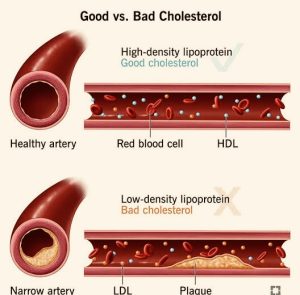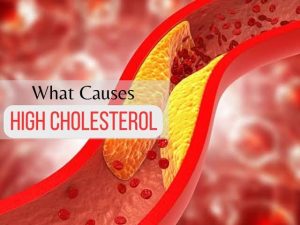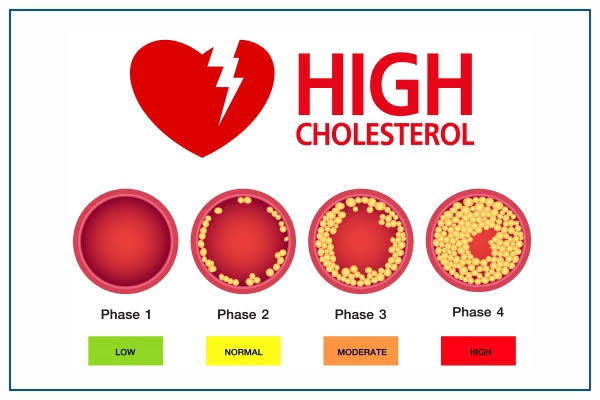I thought I was healthy, but the Lipid Lurker had other plans. It crept up on me, silently building its army of plaque and blockages in my arteries. I was oblivious, until the day my doctor delivered the diagnosis: high cholesterol. My world was turned upside down, but I refused to let the Lipid Lurker win. I armed myself with knowledge, nutrition, and determination, and set out to reclaim my health.
The battle was fierce, but I fought back with every fiber of my being. I transformed my diet, incorporating delicious and healthy foods that nourished my body and satisfied my taste buds. I moved my body, finding joy in exercise and movement. And I managed my stress, learning to calm my mind and soothe my soul. Slowly but surely, the Lipid Lurker’s grip on my health began to loosen.
Today, I stand victorious, my cholesterol levels under control, my heart healthy and strong. The Lipid Lurker still lurks, but I know its tricks and I’m ready for battle. I’ve discovered a newfound appreciation for life, and a deep understanding of the power of resilience and determination. I’ve learned that even in the darkest of times, there is always hope, and that with every healthy choice, I’m writing a new chapter in my story – one that’s filled with joy, vitality, and the sweet taste of triumph.
What is Cholesterol?
Cholesterol is a type of fat (lipid) found in the blood that plays various vital roles in the body’s functioning. It is essential for:
1. Building and maintaining cell membranes
2. Producing hormones (e.g., estrogen, testosterone)
3. Manufacturing bile acids for digestion
4. Supporting brain function and development
5. Regulating vitamin D levels
What is High Cholesterol?

High cholesterol, also known as hypercholesterolemia, is a condition where there is an excessive amount of cholesterol in the blood. This can lead to:
1. Atherosclerosis (hardening of the arteries)
2. Plaque buildup in arteries
3. Increased risk of:
– Heart disease
– Heart attack
– Stroke
– Peripheral artery disease
– Kidney disease
Types of High Cholesterol
1. Familial Hypercholesterolemia (FH): A genetic disorder that causes very high LDL levels.
2. Polygenic Hypercholesterolemia: A combination of genetic factors that lead to high LDL levels.
3. Secondary Hypercholesterolemia: High cholesterol caused by another medical condition or medication.
4. Hyperlipidemia: Elevated levels of triglycerides and LDL.
5. Dyslipidemia: Abnormal lipid levels, including high LDL and low HDL.
6. Hypercholesterolemia: High levels of total cholesterol.
7. Sitosterolemia: A rare genetic disorder that causes high levels of plant sterols.
8. Cholesterol Ester Storage Disease: A rare genetic disorder that affects cholesterol metabolism.
9. Lp(a) Hypercholesterolemia: High levels of lipoprotein(a), a type of LDL.
It’s important to note that high cholesterol can also be classified as:
– Mild: 200-239 mg/dL
– Moderate: 240-289 mg/dL
– Severe: 290 mg/dL or higher
Causes of High Cholesterol

1. Poor diet
2. Obesity
3. Lack of exercise
4. Smoking
5. Overconsumption of alcohol
6. Age
7. Family history
8. Medical conditions (e.g., diabetes, kidney disease, hypothyroidism, lupus)
9. Medications (e.g., certain antidepressants, antihistamines, blood pressure medications)
10. Genetics
11. Sedentary lifestyle
12. High intake of saturated and trans fats
13. Low intake of fiber and omega-3 fatty acids
14. Certain foods (e.g., egg yolks, organ meats, shellfish)
15. Stress
16. Sleep apnea
17. Polycystic ovary syndrome (PCOS)
18. Cushing’s syndrome
19. Hypopituitarism
20. Certain supplements (e.g., anabolic steroids, human growth hormone)
It’s important to note that high cholesterol can be caused by a combination of these factors, and that some may be outside of your control. However, by making healthy lifestyle choices and managing any underlying conditions, you can help lower your cholesterol levels and reduce your risk of heart disease.
Signs and Symptoms
1. Chest pain or angina
2. Shortness of breath
3. Dizziness or lightheadedness
4. Cold legs or arms
5. Fatigue
6. Swelling in legs, ankles, or feet
7. Palpitations or irregular heartbeat
8. Confusion or memory loss
9. Slurred speech
10. Numbness or tingling in face, arm, or leg
11. Sudden severe headache
12. Vision changes or blurred vision
13. Difficulty speaking or understanding speech
14. Sudden weakness or paralysis
15. Pain in neck, jaw, or back
16. Nausea or vomiting
17. Rapid or irregular heartbeat
18. Coughing up blood or pink, frothy mucus
19. Blue tinge to lips or fingers
20. Pain in legs when walking (intermittent claudication)
Keep in mind that many of these symptoms can also be caused by other conditions, and only a healthcare professional can determine if they are related to high cholesterol or another condition.
Prevention
1. Eat a heart-healthy diet:
– Increase soluble fiber intake (oatmeal, fruits, vegetables)
– Choose healthy fats (avocado, nuts, olive oil)
– Limit saturated and trans fats (red meat, full-fat dairy, processed foods)
2. Maintain a healthy weight
3. Exercise regularly:
– Aim for 150 minutes of moderate-intensity aerobic exercise
– Incorporate strength-training and high-intensity interval training
4. Quit smoking and limit alcohol intake
5. Manage stress
6. Get enough sleep (7-8 hours)
7. Monitor and manage underlying health conditions (diabetes, high blood pressure, etc.)
8. Limit dietary cholesterol intake (egg yolks, organ meats, shellfish)
9. Increase omega-3 fatty acid intake (fatty fish, flaxseeds, walnuts)
10. Consider plant sterols and stanols (natural cholesterol-lowering substances)
11. Limit processed and packaged foods
12. Get regular check-ups and cholesterol screenings
Treatment
Lifestyle Changes:
1. Diet: A heart-healthy diet that is rich in fruits, vegetables, whole grains, and lean protein sources.
2. Exercise: Regular physical activity, such as walking, jogging, cycling, or swimming, for at least 150 minutes per week.
3. Weight management: Maintaining a healthy weight through a combination of diet and exercise.
4. Quit smoking: Smoking cessation programs and support.
5. Limit alcohol intake: Reducing or avoiding alcohol consumption.
Medications:
1. Statins: Most commonly prescribed cholesterol-lowering medications.
2. Bile acid sequestrants: Resins that bind to bile acids in the gut and reduce cholesterol absorption.
3. Cholesterol absorption inhibitors: Medications that reduce cholesterol absorption in the gut.
4. Fibrates: Medications that reduce triglyceride production in the liver.
5. Niacin: Vitamin B3 that improves blood lipid profiles.
6. PCSK9 inhibitors: Injectables that reduce LDL cholesterol production.
Other Treatment Options:
1. Lipoprotein apheresis: A procedure that removes excess LDL cholesterol from the blood.
2. Cholesterol-lowering supplements: Plant sterols, stanols, and other natural substances that can help lower cholesterol.

